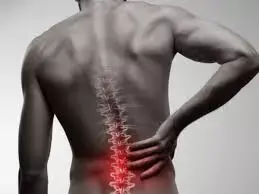- Home
- Medical news & Guidelines
- Anesthesiology
- Cardiology and CTVS
- Critical Care
- Dentistry
- Dermatology
- Diabetes and Endocrinology
- ENT
- Gastroenterology
- Medicine
- Nephrology
- Neurology
- Obstretics-Gynaecology
- Oncology
- Ophthalmology
- Orthopaedics
- Pediatrics-Neonatology
- Psychiatry
- Pulmonology
- Radiology
- Surgery
- Urology
- Laboratory Medicine
- Diet
- Nursing
- Paramedical
- Physiotherapy
- Health news
- Fact Check
- Bone Health Fact Check
- Brain Health Fact Check
- Cancer Related Fact Check
- Child Care Fact Check
- Dental and oral health fact check
- Diabetes and metabolic health fact check
- Diet and Nutrition Fact Check
- Eye and ENT Care Fact Check
- Fitness fact check
- Gut health fact check
- Heart health fact check
- Kidney health fact check
- Medical education fact check
- Men's health fact check
- Respiratory fact check
- Skin and hair care fact check
- Vaccine and Immunization fact check
- Women's health fact check
- AYUSH
- State News
- Andaman and Nicobar Islands
- Andhra Pradesh
- Arunachal Pradesh
- Assam
- Bihar
- Chandigarh
- Chattisgarh
- Dadra and Nagar Haveli
- Daman and Diu
- Delhi
- Goa
- Gujarat
- Haryana
- Himachal Pradesh
- Jammu & Kashmir
- Jharkhand
- Karnataka
- Kerala
- Ladakh
- Lakshadweep
- Madhya Pradesh
- Maharashtra
- Manipur
- Meghalaya
- Mizoram
- Nagaland
- Odisha
- Puducherry
- Punjab
- Rajasthan
- Sikkim
- Tamil Nadu
- Telangana
- Tripura
- Uttar Pradesh
- Uttrakhand
- West Bengal
- Medical Education
- Industry
Etoricoxib more Efficacious than Acetaminophen in reducing Pain after Lumbar Laminectomy Surgery

A recent study by researchers in Thailand has showed that as compared to acetaminophen, etoricoxib can significantly reduce post-operative morphine consumption and improve the pain score at 12, 24, and 48 hours, after lumbar laminectomy (spine surgery).
Degenerative change of the lumbar spine can cause lumbar stenosis or lumbar nerve root compression. Lumbar laminectomy is one of the common operative procedures to treat lumbar stenosis. Conventional lumbar laminectomy usually involves the extensive dissection of soft tissue, ligament, and bone, typically causing moderate to severe post-operative pain, especially in the first few days after the surgery. Proper pain management is essential to allow patients to pass through the surgical treatment experience; pain relief is required to mobilize the patient and speed recovery.
Currently, pain management during the peri-operative period is based on the multimodal analgesia principle, in which a combination of analgesics is used to minimize the dosage, optimize efficacy and minimize the risk of adverse events. The use of non-steroidal anti-inflammatory drugs (NSAIDs) together with opioid drugs also can significantly reduce side effects of the latter, such as nausea, vomiting, bloating and constipation. NSAIDs are not recommended as the first choice during and post-operative period because of the risk of bleeding, but selective cyclooxygenase-2 (COX-2) inhibitors do not affect platelet aggregation.
Etoricoxib is a drug in the selective COX-2 inhibitors group that reportedly reduces pain in acute conditions, such as in patients who have undergone dental surgery, bone and joint surgery, as well as chronic pain such as rheumatoid arthritis.10,11 The dosage for chronic pain is 30 mg-90 mg per day and the dosage for acute pain is 90-120 mg per day.
Acetaminophen is useful for the treatment of post-operative pain. The analgesic effect seems comparable with NSAIDs. Opioid and non-opioid analgesic combinations appear to be safe and effective after lumbar laminectomy.
In the randomized trial published in Global Spine journal, Weraarchakul et al studied whether postoperative etoricoxib improves post-operative pain and reduces morphine consumption. They studied the effectiveness of etoricoxib for 48 hours because most patients experience intense pain during the immediate post-operative period and require analgesic drugs for 48 hours after surgery,
So, the current study was designed to compare the effectiveness of etoricoxib with that of acetaminophen at dosages similar to those used in previous studies of spine surgeries.
They found that peri-operative administration of etoricoxib resulted in less morphine consumption, lower pain scores, and the number of adverse events compared with acetaminophen after lumbar laminectomy with or without instrumentation. Previous studies in lumbar spine surgery have demonstrated the analgesic efficacy of etoricoxib in association with the peri-operative administration of celecoxib, rofecoxib and parecoxib. Patients on etoricoxib used 24% less total morphine compared with acetaminophen.
No severe adverse events (such as respiratory depression, severe allergy, thromboembolism, or severe cardiovascular adverse event) were seen with etoricoxib. The incidence of adverse events was similar between etoricoxib and acetaminophen except for pruritus, which was significantly more frequent in the acetaminophen group. This result may be explained by the lower morphine consumption in the etoricoxib group.
The study concludes that the administration of etoricoxib significantly reduces (relative to acetaminophen) post-operative morphine consumption and improves pain scores at 12, 24, and 48 hours after surgery. However, both acetaminophen and etoricoxib are effective in treating acute post-laminectomy pain. Among adverse events, only pruritus was significantly different between the groups, having a higher incidence in the acetaminophen group.
Reference:
Weraarchakul S, Sae-Jung S. Etoricoxib Can Reduce Post-Operative Morphine Consumption and Pain Score in Patients Undergoing Lumbar Laminectomy Compare to Acetaminophen: A Randomized Trial. Global Spine Journal. 2023;13(6):1433-1440. doi:10.1177/21925682211035719
MBBS, DrNB Neurosurgery
Krishna Shah, MBBS, DrNB Neurosurgery. She did her MBBS from GMC, Jamnagar, and there after did direct 6 Year DrNB Neurosurgery from Sir Ganga Ram Hospital, Delhi. Her interests lie in Brain and Spine surgery, Neurological disorders, minimally invasive surgeries, Endoscopic brain and spine procedures, as well as research.
Dr Kamal Kant Kohli-MBBS, DTCD- a chest specialist with more than 30 years of practice and a flair for writing clinical articles, Dr Kamal Kant Kohli joined Medical Dialogues as a Chief Editor of Medical News. Besides writing articles, as an editor, he proofreads and verifies all the medical content published on Medical Dialogues including those coming from journals, studies,medical conferences,guidelines etc. Email: drkohli@medicaldialogues.in. Contact no. 011-43720751


